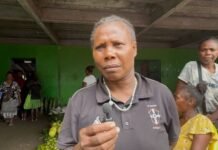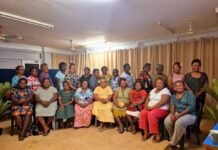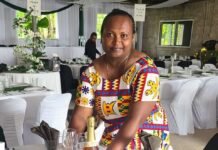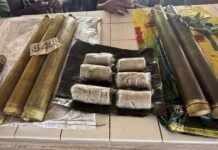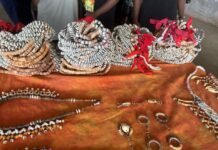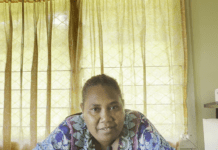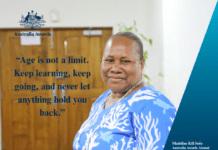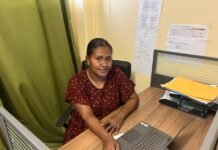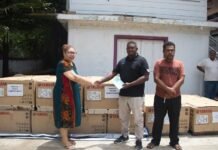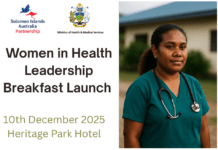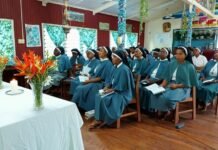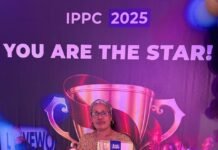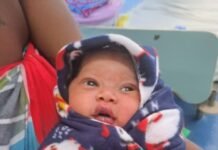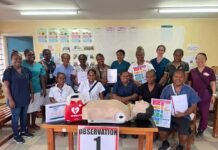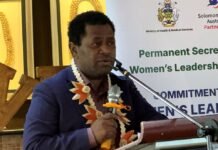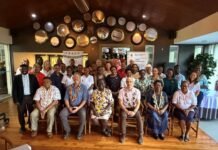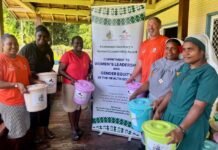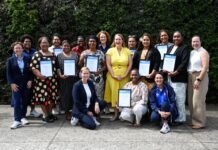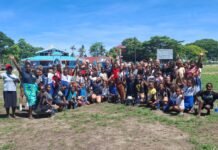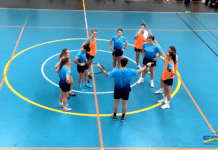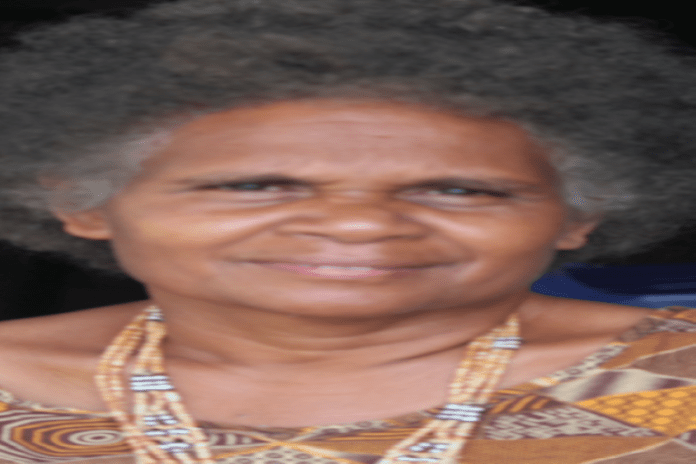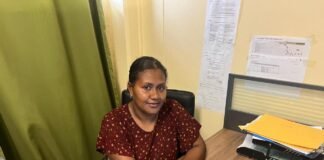BY JEFFREY TAFOLEHE
RECENTLY a regional conference on women’s leadership and political participation was held in Honiara.
The conference was intended to offer an opportunity for stakeholders in the Solomon Islands and experts from other Pacific Islands countries to engage in in-depth dialogue on how best to increase women’s participation and representation in leadership and politics.
Amongst the participant was renowned local female academic,Dr. Alice Aruheeta Pollard who was invited to be one of the panelists in the discussion.
In an exclusive interview with her she shared some views on the conference topic and its significant way forward.
Solomon Women Newspaper (SWN): Tell us about yourself?
Dr. Alice Aruheeta Pollard (Dr. AAP): My name is Alice Aruheeta Pollard. I was a former secondary school teacher and then I headed Women’s division then at the end of 1999 I resigned from Government then I have been working as a private person. Back then I was able to get a scholarship from the AusAid so I went and did my Bachelor of Arts and Masters in Melbourne from 1994 to 1997. In 2003 to 2006, I did my doctoral at Wellington in New Zealand. I returned and engaged in the private sector, got contested in the election twice from 2006 and 2014 however was unsuccessful.
SWN: Why do you choose to attend this conference?
Dr. AAP: I was invited to be a member of the panelist. Also when I see the topic it was very interesting for me as well.
SWN: What can you see as very important for this conference?
Dr. AAP: For me the most important thing is to break through the men’s domain in political leadership sphere. When I look at this country women have already occupied the different spheres. When you look at churches women are there, at the NGOs women are also there, when you look at the culture women are there, but when you look at the parliament, that is where women are absent. So I see it is very important that women become part of that very important leadership sphere which will enabled women to play a major role with our men in terms of decision making and political leadership.
SWN: What are some challenges women in Solomon Islands continues to face in terms of Women in leadership and Political participation?
I think the trend is changing from 1970’s and 80’s women have not been able to forward themselves to contest. Generally women looked at the political sphere as the men’s domain because it is a public sphere. However from 1990’s right up to now, in 1997, 2001, 2006, 2010, 2014 significant number of women forward themselves to contest so that’s a significant change in women’s mindset. Instead of hiding away lets forward ourselves to the fore-front and try contesting the election. This is an area women do not live in rather a male dominate domain. But to see women forwarding themselves to contest and t campaign and to compete against men candidates in the constituencies, is a big achievement for women. If you can find one woman and ten men it means the level of confidence women have to contest with the men in itself gives a big message.
SWN: Are pacific leaders delivering on their commitments towards the equality of men and women?
Dr. AAP: When we really look at obligations, conventions, the policies that were adapted and endorsed by international, regional and national bodies are really good. I think they are playing a major role in pushing the agenda but when I look at it in terms of practical sense it is lacking because a lot of this conventions and policies never get down to our rural women. So it’s the practical aspect of it is lacking. You can talk about we endorse this and this but the actual fact ordinary Solomon Island women don’t know what those are. It doesn’t sink down to our rural population, so that’s why I said yes it’s good to endorse and push reforms and policies. It’s good but thinks about the rural population who are the majority; how much of this information gets to them. This is one lacking aspect. The other thing I would like to contribute is the word ‘mainstreaming.’ Mainstreaming is a formal word for formal structures because our formal structures are hierarchical like level one level two and you go up. So it is structured, it is hierarchical, it is formal. The word mainstreaming doesn’t work for the rural setting. There is no structure in the rural setting, we just live as we live, we go to the garden we come back, we cook. Our life is not formal so we are the informal structure. When you want to mainstream in an informal structure what are you talking about? So mainstreaming doesn’t work. We are already mainstreaming in the village. You see men going to the garden, cooking, taking care of the children. All the work women do men also done that as well. So in fact it’s already being mainstreamed. So it is within the formal sectors that mainstream needs to happen. In the informal sector mainstream already happened. Men and women are working together in development, in church, in running the community, in income generation and in livelihood programs. n How can civil society help in moving things forward in making gender equality commitments a lived reality for all pacific islanders? In Solomon Islands I’m aware that in the rural setting only civil society can get down to it. Only the civil societies engage actively with the communities and not so much the Ministry or Government services so I think the more they engage with the rural community, the more the more they engage with practical program, practical things rather than we go into the communities and talk and talk is not enough. Let’s do tangible practical things in the community so they can see it. I’m also aware that in the community, hands on skill are very important for them. When they see it with their eyes, they touch it with their hands and they do it, that is meaningful for them rather than how many workshops delivering information these cannot sink in well for them unless they connect that theoretical approach to real tangible practical things, only then it can be meaningful because this makes sense for them. And also to the rural community what is the most important thing? Like we talked about children violence, women violence, we talked about all these things but to a rural community how is violence rated? Is it number one to them or the livelihood is number one to them? Because we have things like gender is being propagated from outside of our country and because they have strings attached to it such as providing money for it. However our real need does not have financial resources to support it so I fact we are pulled by the nose because they have the money to do those programs. Our real need is livelihood and that is what we need the money for but for them that is not the priority, violence is.
SWN: What lessons can be learned from Pacific countries who have adopted reserved seats for women in elected bodies at the national and local levels?
Dr. AAP: I think we can learn from the Bougainville case and as Peter Forau mentioned, Fiji has got a different system, Vanuatu has got another system and these are systems so this is a system that can work in the region. So I think what we are looking at is what in the region can work for us? So for Vanuatu yes, it works for them will that worked for us? Because if it works for Vanuatu doesn’t mean it will work for us. So we really need to critically analyze these different systems and then come up with a system where embraces our culture and our way of life. And the TSM – temporary special measures is for Bougainville and I remembered the Ministry of Women, Youth, Children and family Affairs and the Western group submitted ours up to 10 but the Government turned them down. In my view TSM is a good way to start because we are trying to change the mindset of our voters to vote and let’s see how women will perform being very vocal and if they take this will they perform or remain the same. So it’s a beginning of changing a mindset and giving a space for women leaders to demonstrate their potential – whether they are capable or not.
SWN: What actions should be taken to increase women’s representation in power and decision making?
Dr. AAP: Getting into Parliament is not something where you qualify to do it, rather its people who voted you in. We cannot regulate the rights of the voter to vote who he or she wishes to vote we can talk a lot but it all comes back to the voter- the power is in the hands of the voter. Therefore even though we may push for representation or number, individuals still have the power. Thus we need the voters to be well informed so that he or she can make his/her decision to vote without any obligations. It all rests in the power of the voter and we don’t have the right to force whom we want them to vote.






